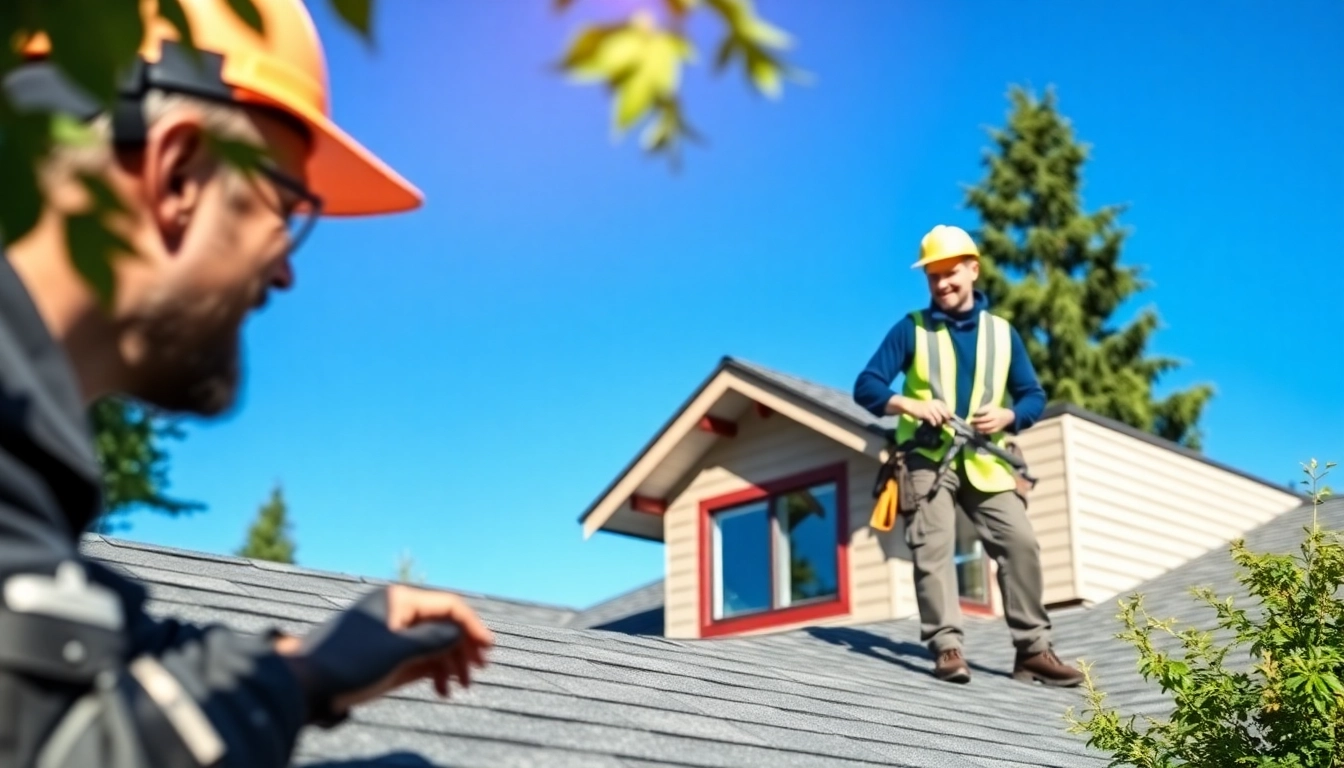Understanding Roofing Vancouver Wa: An Overview
When it comes to ensuring the safety and longevity of your home, having a dependable roof is imperative. The region of Vancouver, WA, with its unique climate and environmental conditions, comes with specific considerations that homeowners should keep in mind when discussing their roofing needs. This comprehensive guide dives deep into the intricacies of Roofing Vancouver Wa, covering various aspects including materials, contractor selection, installation processes, maintenance practices, and local regulations. By the end of this article, you will be well-equipped to make informed decisions about your roofing projects.
The Importance of Quality Roofing
Quality roofing is not just about aesthetics; it plays a crucial role in protecting your home from harsh weather, insulation efficiency, and overall structural integrity. A well-designed roof can contribute to energy savings, enhance property value, and provide peace of mind. Here are several reasons why investing in quality roofing is essential:
- Protection Against Elements: The roof shields your home from rain, wind, snow, and other environmental conditions that could lead to water damage or decay.
- Energy Efficiency: A properly insulated roof helps maintain indoor temperatures, reducing reliance on heating and cooling systems and ultimately saving on energy bills.
- Increased Property Value: Prospective buyers are more likely to invest in homes that feature well-maintained roofs, making it a key selling point for real estate.
- Safety Assurance: A stable roof ensures the structural integrity of your home, safeguarding you and your family from potential hazards.
Common Roofing Materials Used in Vancouver Wa
Roofing materials greatly influence performance, longevity, and aesthetics. In Vancouver, WA, several materials stand out, each with distinct advantages:
- Asphalt Shingles: Popular for their affordability and ease of installation, asphalt shingles are prevalent across the area. They come in various colors and styles and typically last 15-30 years.
- Metal Roofing: Known for durability, metal roofing can withstand extreme weather conditions. It is energy-efficient, recyclable, and has a life expectancy of 40-70 years.
- Tile Roofing: Tile roofs are aesthetically pleasing and highly durable. They offer excellent insulation and can last over 50 years with proper care.
- Wood Shakes: With a natural beauty, wood shakes are commonly used but require more maintenance and protection from pests and rot.
Local Climate Considerations for Roofing
The climate in Vancouver, WA, is characterized by a high level of precipitation and mild temperatures throughout the year. This dynamic can negatively affect roofing materials if not appropriately considered. Here are critical climate-related factors to remember:
- Rain and Moisture: Vancouver’s significant rainfall necessitates roofing materials that can resist water absorption and mold growth.
- Temperature Variations: While winters are mild, occasional cold snaps can occur. Roofing systems must be resilient to both cold and mild temperatures to perform effectively.
- Wind Resistance: Given the windy conditions, especially during storms, a roof must be securely attached to withstand high gusts without damage.
Choosing the Right Roofing Contractor
Hiring a qualified roofing contractor is critical for ensuring a successful roofing project. The right professional not only understands the local codes and regulations but also has the expertise to execute the job to the highest standards. Here are the essential qualities to look for when selecting a roofing contractor:
Essential Qualities to Look for in Contractors
When searching for a roofing contractor, consider evaluating the following attributes:
- Experience and Expertise: Look for contractors with significant experience in the roofing industry, specifically in the type of roof system you want.
- Licensing and Insurance: Ensure that the contractor is licensed to operate in Vancouver, WA, and carries comprehensive liability insurance to protect against potential damages or accidents during the project.
- Clear Communication: Effective communication is critical. Choose a contractor who provides clear explanations, answers your questions, and keeps you updated throughout the process.
- Reputation: Check online reviews and ask for references from previous clients. A contractor with positive feedback and established trust in the community is preferable.
How to Evaluate Contractor Estimates
Once you’ve shortlisted potential roofing contractors, the next step involves obtaining and evaluating their bids. Here’s how to approach this process:
- Get Multiple Estimates: Request quotes from at least three different contractors to understand the market rate for your project.
- Compare Scope of Work: Ensure the estimates include similar scopes of work to accurately assess pricing differences.
- Assess Material Choices: Evaluate the quality of materials proposed. Cheaper options may reduce upfront costs but could lead to higher long-term expenses due to poor durability.
- Review Payment Terms: Understand the payment schedule and terms outlined in the estimate. Reputable contractors typically require a deposit with the rest due upon completion.
Checking Reviews and Credentials
Before making a final decision, conduct a thorough review of the contractors’ credentials.
- Online Reviews: Websites such as Yelp and Google reviews provide insights into customer experiences and satisfaction levels.
- Professional Associations: Verify memberships in relevant trade associations. Membership may indicate credibility and adherence to high industry standards.
- Better Business Bureau (BBB): Check the BBB rating of potential contractors to gauge their reliability and how they address customer complaints.
Roofing Installation Best Practices
Once you have chosen a contractor, understanding the roofing installation process can help you prepare and ensure that it goes smoothly. Here is an overview of best practices for roofing installation in Vancouver, WA:
Preparing Your Home for Roofing Installation
Effective preparation can lead to a seamless roofing process and minimize disruptions. Here are key steps to take:
- Clear the Area: Remove any outdoor furniture, decorations, and plants near the work site to prevent damage and create a safe working environment.
- Secure Indoor Items: If possible, secure fragile items inside your home to prevent any potential vibrations or falling debris from causing damage.
- Discuss Work Hours: Coordinate with your contractor regarding work hours to ensure you’re prepared for noise or disruptions.
Step-by-Step Roofing Installation Process
The following steps outline the common procedures involved in a roofing installation project:
- Inspection: The contractor will inspect your existing roof and assess the structural integrity.
- Removal of Old Roofing: If applicable, the current roofing materials will be removed safely and disposed of according to local regulations.
- Repairing Underlayment: Inspect and repair any underlayment or decking issues to ensure a solid base for the new roofing.
- Installation of New Material: The chosen new roofing material is installed following manufacturer guidelines and best practices.
- Final Inspection: Once the installation is complete, a thorough inspection is conducted to ensure everything meets local codes and regulations.
Safety Tips During Installation
Safety should always be a priority during roofing projects. Consider the following safety tips:
- Use of Safety Gear: Ensure all workers wear appropriate safety gear, including helmets, harnesses, and non-slip footwear.
- Fall Protection Systems: Utilize guardrails, safety nets, or personal fall arrest systems to minimize the risk of falls.
- Clear Communication: Maintain open lines of communication among crew members to prevent accidents and ensure efficient workflows.
Maintenance and Care for Your Roof
Proper maintenance can extend the life of your roof and prevent costly repairs down the line. Here are essential maintenance practices to follow:
Regular Inspection Guidelines
Conducting regular inspections allows you to identify potential issues before they escalate. Here’s what to check:
- Visual Inspection: Regularly check your roof from the ground or a safe vantage point. Look for missing shingles, discoloration, or bulging areas.
- Gutter Maintenance: Clear gutters of debris and ensure they allow for proper drainage, preventing water buildup that could damage roofing materials.
- Internal Checks: Keep an eye on your ceilings and walls for any leaks or signs of water damage, which could indicate roofing issues.
Common Roof Repairs in Vancouver Wa
Common roofing repairs in the Vancouver area often include:
- Shingle Replacement: Addressing weather-damaged or missing shingles is crucial to maintaining a water-tight seal.
- Flashing Repairs: Faulty flashing around chimneys and vents can lead to leaks, making timely repairs critical.
- Gutter Repairs: Damaged or misaligned gutters can cause water drainage issues, leading to further roof damage.
Extending the Life of Your Roof
To maximize the lifespan of your roof, consider these tips:
- Routine Cleaning: Remove debris such as leaves and branches to prevent water buildup and potential mold growth.
- Timely Repairs: Address minor issues promptly to prevent them from developing into major problems.
- Professional Inspections: Schedule professional inspections every few years or following severe weather to catch hidden issues early.
Local Regulations and Permits for Roofing Vancouver Wa
Understanding local regulations and permits is vital for any roofing project in Vancouver, WA. Compliance not only ensures the work is legal but also enhances safety and quality standards.
Understanding Building Codes in Vancouver Wa
Vancouver has specific building codes that govern roofing standards. Familiarize yourself with these codes before starting your project to ensure compliance:
- Material Specifications: Local codes may dictate which materials can be used based on durability and environmental impact.
- Installation Standards: The building codes often specify installation techniques to ensure structural integrity and safety.
- Building Height Limits: There may be regulations regarding the maximum height of roofs, depending on the zone.
Necessary Permits for Roofing Projects
Obtaining the necessary permits is crucial for assuring that your roofing project complies with local laws. Here are common permits you might need:
- Roofing Permit: Most roofing projects require a permit which ensures the work meets safety and building standards.
- Electrical Permits: If your project involves electrical work, such as installations for solar panels, you will need the appropriate permits.
Consulting Local Authorities for Compliance
It’s wise to consult local authorities or a qualified contractor who understands the specific requirements in Vancouver, WA. They can help you navigate the permitting process, ensuring a smooth and compliant project.







